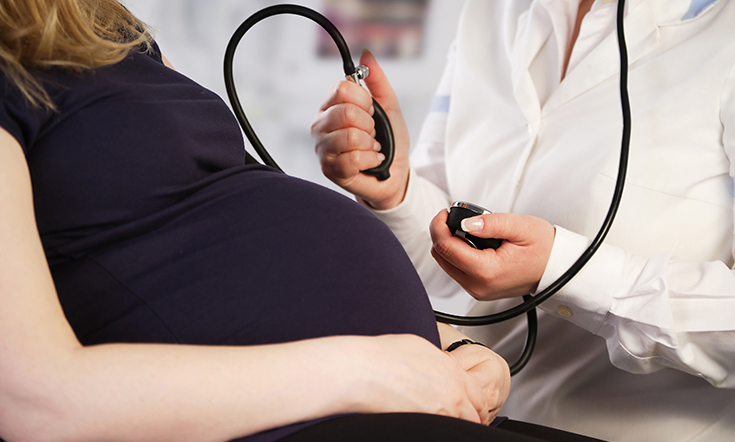

Blood pressure is the power of the blood pushing against the walls of the arteries – (blood vessels that carry oxygenated blood to your body’s system). If the force in the arteries becomes too high, it is called high blood pressure or hypertension.
Normally, there’s a slight change in the blood pressure during your whole pregnancy. It happens because of the pregnancy hormone progesterone relaxes the walls of the blood vessels. By this, it makes the blood pressure fall during the first and second trimesters. That is why sometimes, you feel dizzy when you stand up for too long or get up quickly. Blood pressure during pregnancy is at its lowest between 18 and 20 weeks of pregnancy.
However, according to statistics, about 8% of women have high blood pressure during pregnancy and about 70% of which are first-time pregnancies. Having a high blood pressure whether you have this prior or during conception, you need special care.
How is a pregnant woman’s blood pressure measured?
During prenatal check-ups, your health care provider will measure your blood pressure.
During the BP taking: You have to sit down comfortably, and remove any tight bands from your arm. A cuff is connected to the sphygmomanometer, which measures the blood pressure and shows the result. The health care provider will wrap the sphygmomanometer’s cuff around your arm about 2 inches above your elbow and pump air into it. Then the cuff will be inflated impeding the blood flow in the main vessels in your arm. It feels very tight but it shouldn’t hurt. After that, the air in the cuff is slowly released.
The result has two numbers shown in a fraction form. The nominator or the top figure shows the blood pressure as your heart beats and distributes the blood all over your body parts (systolic blood pressure).
The denominator or the bottom figure shows the blood pressure during your heart relaxes or the ‘rest’ between beats (diastolic blood pressure). If the blood pressure reading is high and your urine test has protein in it, it can indicate an early stage of preeclampsia.
Complications of High Blood Pressure during Pregnancy
- It can cause less blood flow to the placenta reducing the supply of oxygen and nutrients to the baby. It can also potentiate slow baby growth and low birth weight.
- Inducing labour. Sometimes, it is important to induce labour to prevent potentially life-threatening complications to both mother and the baby.
- Abruption placenta – Early separation of the placenta from the uterus. This condition can reduce the baby’s supply of oxygen and nutrients. It can also cause heavy painful bleeding to the mother.
Does Hypertension or Preeclampsia cause further cardio-vascular disease?
According to research, preeclampsia does not necessarily increase a woman’s risk for developing chronic hypertension or other cardiac problems. Women with normal blood pressure, who develop preeclampsia after the 20th week of her first pregnancy, usually go away within about 6 weeks after delivery.
Some women may be more likely to develop high blood pressure or other heart-related problems later in life. The effects of high blood pressure during pregnancy vary depending on a lot of different factors. Having early and regular check-up is very helpful for you and your baby.
What is pre-eclampsia?
It usually occurs in the third trimester of pregnancy approximately, after the 27th week. This condition is thought to happen when the placenta isn’t working properly.
Diagnosis:
To confirm this condition, certain tests by the doctor or your midwife will be performed. The tests includes: Blood pressure monitoring and urine test.
Key signs are high blood pressure and presence of protein in the urine (proteinuria). It also includes blood tests, monitoring of foetal development by the doctor and other symptoms that seem to occur with preeclampsia.
Signs and Symptoms:
- Persistent headaches
- Sudden and severe swelling of your hands, feet or face.
- Changes in vision. Blurring of vision, light sensitivity and loss of vision.
- Pain below your ribs.
- Unexplained weight gain, usually more than 2 kilograms (5pounds) per week.
How to prevent complications of high blood pressure in pregnancy?
Before pregnancy:
- Collaborate with your doctor to lower you blood pressure.
- Take a weight loss plan through diet and exercise if needed.
- Lifestyle changes like stop cigarette smoking, limiting your salt intake, having a regular exercise, having a losing weight plan can also be helpful.
- Consult your doctor to know how hypertension might affect you and your baby during pregnancy and what can he suggest to prevent or lessen the complication problems.
- If having a maintenance medication to control blood pressure, never stop or change your medications on your own. Ask your doctor whether you should stop taking them or change the dosage of the drug. According to research, angiotensin-converting enzyme (ACE) inhibitors and angiotenisin II receptor antagonist should be avoided during pregnancy.
During pregnancy:
- See your doctor regularly and as soon as possible to work on the changes of your blood pressure and weight.
- Have a regular prenatal check-up.
- Have you blood pressure and urine monitored at home if your doctor suggests you to do so.
- Avoid alcohol consumption and cigarette smoking.
- Ask your doctor about any over-the-counter drugs that you are taking if it can affect your condition.
- If you develop any warning signs of preeclampsia. Immediately consult your doctor.
Treatment
When your blood pressure increases slightly and you are not near the end of pregnancy, have a bed rest to reduce the pressure. If the blood pressure remains normal, pregnancy may be allowed to continue. If you develop signs of preeclampsia, you and your baby will be closely monitored by the doctor. The only cure for preeclampsia is the giving birth of the baby. Sometimes, your health care provider will suggest an early delivery either through induction of labour or a caesarean section.






















